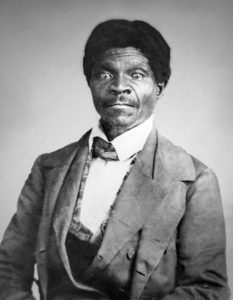
Dred Scott, 1857
The birth of Dred Scott in 1799 is celebrated on this date. He was a Black slave and abolitionist.
Scott was born a slave in Virginia as the property of the Peter Blow family. He and the Blow family moved to St. Louis in 1830, but due to financial problems, the Blow family had to sell Scott to Dr. John Emerson, a doctor for the United States Army. Dr. Emerson traveled extensively in Illinois, Minnesota, and Wisconsin territories, including Fort Snelling, where the Missouri Compromise prohibited slavery. During these travels, Scott met and married his wife, Harriet Robinson, and Dr. Emerson met and married his wife, Irene Sanford.
The Scotts and the Emersons returned to Missouri in 1842. Dr. Emerson died a year later, and John F.A. Sanford, Mrs. Emerson's brother, became executor of the Emerson estate. Scott filed his case in 1846 and first went to trial in 1847 in a state courthouse in St. Louis. The Blow family financed his legal defense. They lost the initial trial but, due to hearsay evidence, were granted a second trial by the presiding judge. Three years later, in 1850, a jury decided the Scotts should be freed under the Missouri doctrine of 'once free, always free.' Mrs. Emerson, by then a widow, appealed.
Two years later, the Missouri Supreme Court struck down the lower court ruling, saying, "Times now are not as they were when the previous decisions on this subject were made." Once more, the Scotts were returned to their masters as slaves. The Scotts sued again in the St. Louis Federal Court with the help of new lawyers. The Scotts lost this case and appealed to the Supreme Court. In 1857, Chief Justice Roger B. Taney delivered the majority opinion that Dred Scott had no claim to freedom, that slaves were property and not citizens and thus could not bring suit against anyone in federal court, and that because slaves were private property, the federal government cannot revoke a person's right to own one based upon where they live, thus nullifying the essence of the Missouri Compromise.
He also argued that Scott was a slave and private property and was thus protected by the Fifth Amendment, which says that property cannot be taken away without "due process." His unsuccessful legal record was in the famous lawsuit Dred Scott v. Sandford, which bears his name. After the case, Scott was returned to his original owners, the Blows, who granted him freedom less than a year before his death from tuberculosis on September 17, 1858.
Dred Scott, whose zeal for Black equality and humanity led him to sue America for his freedom, is buried in Calvary Cemetery in St. Louis, Missouri.
History of American Slavery
by Duncan Clarke
JG Press, Copyright 1998
PRC Publishing Ltd.
ISBN 1 57215 256 7
The Encyclopedia Britannica, Twenty-fourth Edition.
Copyright 1996 Encyclopedia Britannica Inc.
ISBN 0-85229-633-0